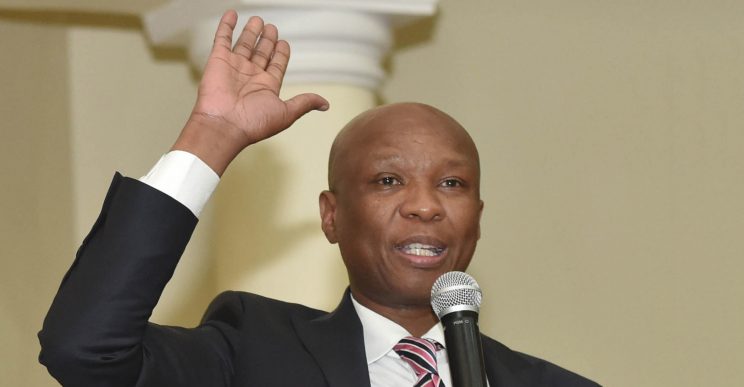In a dramatic turn of events that’s shaking the very foundations of South Africa’s political landscape, Zizi Kodwa, the nation’s Minister of Sports, Arts and Culture, has stepped down from his lofty perch. This resignation comes hot on the heels of Kodwa’s appearance in a Johannesburg courtroom, where he faced allegations of corruption that would make even the most seasoned political operatives blush.
With the ink barely dry on the charges, Kodwa conveyed his decision to President Cyril Ramaphosa, opting to relinquish his ministerial duties and cabinet membership, a move confirmed by an official statement from the Department of Sports, Arts and Culture. The gravity of the situation is underscored by Kodwa’s release on a bail set at a hefty R30,000, a sum that speaks volumes about the severity of the accusations leveled against him.
Kodwa, however, is not going down without a fight. He vehemently refutes the charges, throwing down the gauntlet and challenging the legal system to prove him wrong. This scandal has reignited debates around the African National Congress’s (ANC) 2017 edict, which mandates that any party leader slapped with criminal charges must temporarily vacate their position until the dust of legal proceedings settles.
The ANC’s track record in enforcing this rule has been, to put it mildly, inconsistent. Yet, it has previously led to the downfall of other high-profile figures, including the former Health Minister Zweli Mkhize and the ousting of Ace Magashule from his role as the party’s Secretary General. The ANC, through the voice of spokeswoman Mahlengi Bhengu-Motsiri, has acknowledged the charges against Kodwa, signaling that the party’s constitutional mechanisms will spring into action, underscoring their commitment to the rule of law.
The roots of this scandal can be traced back to the findings of a judicial commission tasked with unraveling the web of corruption and mismanagement that plagued the tenure of former President Jacob Zuma. Kodwa, along with co-accused Jehan Mackay, a former high-flyer at EOH Holdings, are implicated in a scandal involving contracts exceeding R460 million, awarded by the City of Johannesburg to EOH back in 2016.
President Ramaphosa, who had appointed Kodwa to his cabinet post in March 2023, now finds his judgment called into question. Kodwa’s political career, which includes a stint as deputy minister of state security during the tumultuous July 2021 riots, has been a rollercoaster of ambition and controversy. Despite the current turmoil, Kodwa secured the 25th spot on the ANC’s list of 200 candidates for the National Assembly in the recent election, a testament to his enduring influence within the party ranks.
As the story unfolds, one thing is clear: the political arena in South Africa is in for a seismic shift, and all eyes are on Kodwa as he navigates the treacherous waters of public opinion and legal scrutiny. Stay tuned, as this saga is far from over.
